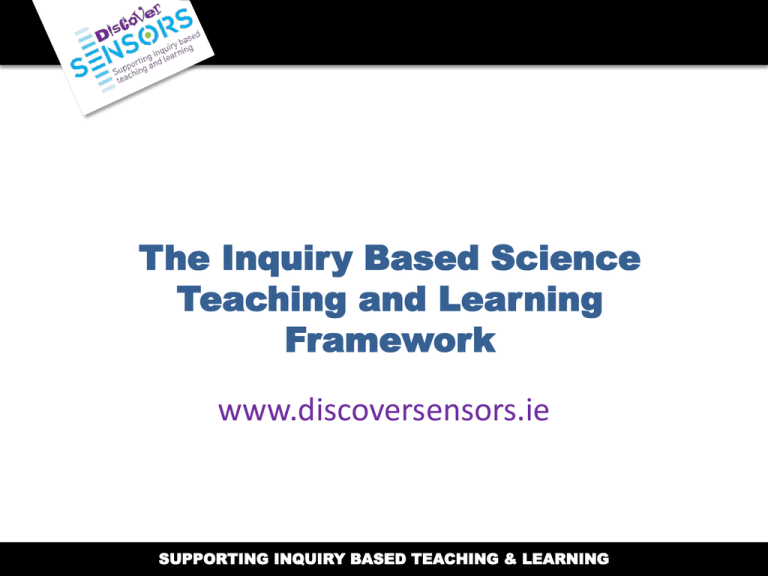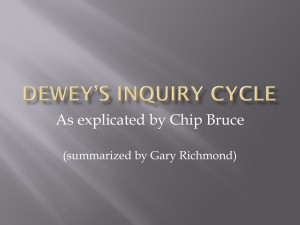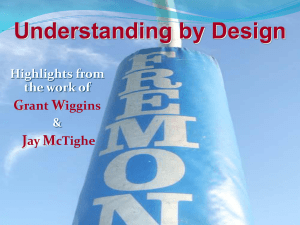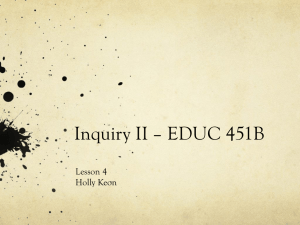ppt - Discover Sensors
advertisement

The Inquiry Based Science Teaching and Learning Framework www.discoversensors.ie SUPPORTING INQUIRY BASED TEACHING & LEARNING What is the Learning Framework? The Discover Sensors framework has been developed by a group of Discover Sensor facilitators and teachers working with Irish education consultants and academics. The DS Framework is designed to be used when planning the teaching of a topic or a theme on the syllabus. This is referred to as a 'learning activity'. SUPPORTING INQUIRY BASED TEACHING & LEARNING What it looks like SUPPORTING INQUIRY BASED TEACHING & LEARNING Getting started When preparing your activity, refer to the syllabus for the appropriate learning outcome. SUPPORTING INQUIRY BASED TEACHING & LEARNING Student Cohort Recommended Sequence Student Cohort – Be clear on your target audience What prior knowledge is required? – Allows you to gauge the level of the activity – Avoids misconceptions SUPPORTING INQUIRY BASED TEACHING & LEARNING Stimulus to Engage Something to focus student’s attention, stimulate wonder, and access prior knowledge. Demonstration Slide/Photograph Reading Video Clip Story Brainstorming http://www.sportsscientists.com/2009/08/analysis-of-bolts-958-wr.html http://www.youtube.com/watch?v=pkkAcGtjoew SUPPORTING INQUIRY BASED TEACHING & LEARNING Science Questions Attention Focusing: Have you seen? Do you notice? Have you seen this before? Why did this happen? Measuring & Counting: How many? How long Comparison: (for sharper observation): In how many ways are the seeds alike and how do they differ? SUPPORTING INQUIRY BASED TEACHING & LEARNING Science Questions Observation: Why---------------? Why ------------------? What is the difference between the -----? Investigation: What happens if …you do-----…you Problem-posing (more sophisticated, follows exploration & understanding) SUPPORTING INQUIRY BASED TEACHING & LEARNING Learning Outcomes content knowledge process skills following a logical pattern of questioning decision-making that enables evidence to be gathered logical thinking and problem solving appreciate the importance of using a fair test appreciate the significance of making and recording measurements and observations accurately activities are basic to all science: observing, measuring, recording, calculating, classifying, investigating and communicating be able to manipulate recorded data and to interpret, present and communicate results in an appropriate manner (pp. 11-12) NCCA Key Skills SUPPORTING INQUIRY BASED TEACHING & LEARNING Learning Outcomes Content Knowledge state demonstrate describe interpret Facts Laws Properties Definitions Formulae know recall prepare name understand identify list discuss compare investigate consider explain select distinguish draw carry out tests SUPPORTING INQUIRY BASED TEACHING & LEARNING www.wordle.net SUPPORTING INQUIRY BASED TEACHING & LEARNING Learning Outcomes - Process following a logical pattern of questioning decision-making that enables evidence to be gathered logical thinking and problem solving appreciate the importance of using a fair test appreciate the significance of making and recording measurements and observations accurately activities basic to all science: observing, measuring, recording, calculating, classifying, investigating and communicating be able to manipulate recorded data and to interpret, present and communicate results in an appropriate manner Junior Science Syllabus (pp. 11-12) SUPPORTING INQUIRY BASED TEACHING & LEARNING NCCA Key Skills SUPPORTING INQUIRY BASED TEACHING & LEARNING SUPPORTING INQUIRY BASED TEACHING & LEARNING Understanding - What the Teacher Does Creates interest Asks open-ended questions: - Why do you think...? - What evidence do you have? - What do you know about…? - How would you explain…? - Assessment Booklets Uses ‘wait time’ Encourages cooperative groups Varies the method of response -‘no hands up’, mini white boards, etc. Responds with comments rather than marks and grades SUPPORTING INQUIRY BASED TEACHING & LEARNING Questions evaluate, create analyse, apply understand, remember SUPPORTING INQUIRY BASED TEACHING & LEARNING Develop the activity Arising from the probing questions for understanding What if-----there was sugar, not salt, in the water Is there any industry, factory ,etc. that could use this information? What would happen if? Has this a practical application? SUPPORTING INQUIRY BASED TEACHING & LEARNING Reflection How many of the outcomes were achieved? Why were certain outcomes not reached/achieved? Was I over/under ambitious? How was my ‘stimulus to engage’ received? Did the topic suit the student cohort? Were the initial science questions helpful? Did my questions probe the students’ understanding What do I need to change for next time? SUPPORTING INQUIRY BASED TEACHING & LEARNING Resources and ICT Internet resources CD/DVD material Datalogging and sensors Other related investigations CWB SciFest BTYST www.discoversensors.ie SUPPORTING INQUIRY BASED TEACHING & LEARNING References Black Box -– Dylan Wiliam, Paul Black. Also Christine Harrison from the Black Box series for Science AfL research. All KCL Mary Budd Rowe - ‘Think Time’ and ‘Wait Time’ (average = 0.9s), she sat in many classrooms with a stopwatch. Ruth Butler 1988 - comment only marking as opposed to grades (or both) raised students scores – this is the original study quoted by Wiliam. John Hattie 2010 – formative feedback is the greatest influence on raising attainment (beats class size, student teacher relationship and every other factor). Stuart Naylor and Brenda Keogh( York) – Concept Cartoons David Johnson and Roger Johnson - cooperative learning improves student engagement, motivation and attainment. SUPPORTING INQUIRY BASED TEACHING & LEARNING







